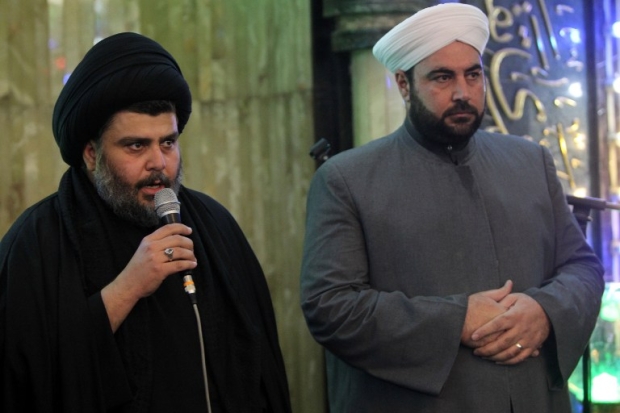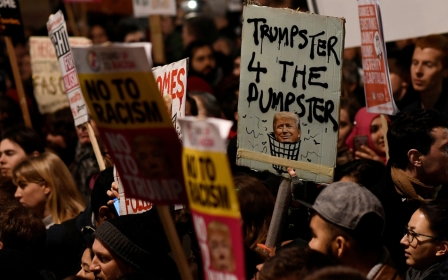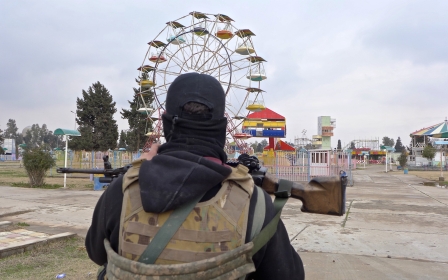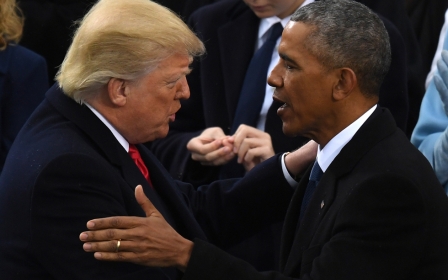Muqtada al-Sadr: The unlikely answer to Iraq's sectarian problem

There is perhaps no Iraqi more synonymous with the sectarian turmoil that has plagued Iraq during the past 15 years than Muqtada al-Sadr.
The cleric has been dubbed a "firebrand" in countless newspaper columns, and has held an almost constant presence in the Iraqi political discourse since the fall of the Baath regime in 2003.
Saraya al-Salam, the militias he heads, formerly known as the Mahdi army, were accused of running sectarian death squads and elements from within helped plunge the country into a vicious civil war.
READ: Iraq's post-IS vision runs into trouble
They also boldly took on the forces of the US-led coalition in Sadr city. But now, with half of Mosul liberated and the end of the Islamic State (IS) in Iraq in sight, Sadr appears to be emerging as a voice of reason and coexistence.
In an interview last week with Turkish TV station TRT, Sadr advocated outreach to those who had followed IS in Mosul, and to the disaffected Sunnis across Iraq.
He said: "I'm holding up a light looking for the moderates because they are scared to show up. There are still moderates among the people but they are scared, but we have to give them a chance to show up and give their ideas."
Sunni outreach
This is not the first time Sadr has advocated cross-sectarian action. In 2013 he expressed solidarity with Sunni protests in Anbar province against the Shia-led government, labelling the demonstration's "Iraq's Arab Spring". A year later, in 2014, his parliamentary bloc banded together with Sunnis as part of an effort to oust prime minister Nouri al-Maliki.
Sadr also used the interview to warn against the Shia militias which currently number upwards of 100,000 in Iraq and despite being instrumental in the fight against Islamic State, have the potential to act as spoilers in post-IS Iraq.
Perhaps his most important development has been as a counter to beleaguered Al-Maliki, who has been scheming a return to power in recent months.
In his TRT interview, he described Maliki's mindset as "militant" and suggested he was consistently spoiling for his next fight, saying: "If Mosul was stable, would Maliki sit and do nothing? No, he will come up with another battle. Car bombings, explosions something else, the new ISIS - a new enemy."
Nationalism over the establishment
There is much personal animosity between Maliki and Sadr - but the latter's public rebukes often stem as much from his staunch nationalism as they do any personal dislike. Maliki, and the militias he is closely connected to – notably the Badr organisation, are the embodiment of Iranian influence in Iraq.
If Iraq is to become a stable and prosperous state after the defeat of IS, then it is a given that sectarianism must be overcome. But few of the country's "old guard" appear to have learnt this lesson after several decades of war and strife.
The cleric is currently pushing a special project which, although light on details, emphasises the need for Iraq to move away from its "party" or "sectarian" mentality of governance towards a technocratic administration.
But an important question remains: is this merely rhetoric or a genuine attempt at outreach?
Power players in Iraq have a distinguished history of saying what needs to be said to win votes in Iraq.
Michael Knights, a Fellow at the Washington Institute for Near East Policy, believes Sadr's track record demonstrates its authenticity. He suggests "it fits into a long-term pattern that reaches back to 2004 in Fallujah when his men fought alongside the Sunnis."
'Muqtada is not the establishment, but he is an ally of the Shia political and religious mainstream for now, against Maliki'
- Michael Knights, Washington Institute for Near East Policy
Knights also believes that much of the sectarian violence the Mahdi army was involved in, was orchestrated by Iranian-backed elements of the militias such as Qais Khazali who now leads the Asa'ib Ahl al-Haq militia". He adds: "Muqtada is a nationalist, unlike Badr, Kataib Hezbollah and Asaib Ahl al-Haq."
He adds that Sadr holds a unique place in Iraqi politics at the moment: "Muqtada is not the establishment, but he is an ally of the Shia political and religious mainstream for now, against Maliki. He has the street muscle to offset Maliki and the PMU [Popular Mobilisation Units]."
READ: Defeating IS will only usher in new conflicts in Iraq
These will likely continue, if for no other reason than to shore up his base in the face of growing Iranian influence in Iraq.
What matters is his outreach - his plan to empower and engage with Sunni moderates could potentially provide the basis for a post-IS Iraq.
- Gareth Browne is a journalist with an interest in current affairs, politics and the Middle East. His work has been featured in VICE, The Daily Mirror and Gulf News. @brownegareth
The views expressed in this article belong to the author and do not necessarily reflect the editorial policy of Middle East Eye.
Photo: Iraqi Shia Muslim cleric Muqtada al-Sadr speaks during a press conference in the holy Shia city of Najaf on 30 April 2016(AFP)
New MEE newsletter: Jerusalem Dispatch
Sign up to get the latest insights and analysis on Israel-Palestine, alongside Turkey Unpacked and other MEE newsletters
Middle East Eye delivers independent and unrivalled coverage and analysis of the Middle East, North Africa and beyond. To learn more about republishing this content and the associated fees, please fill out this form. More about MEE can be found here.







